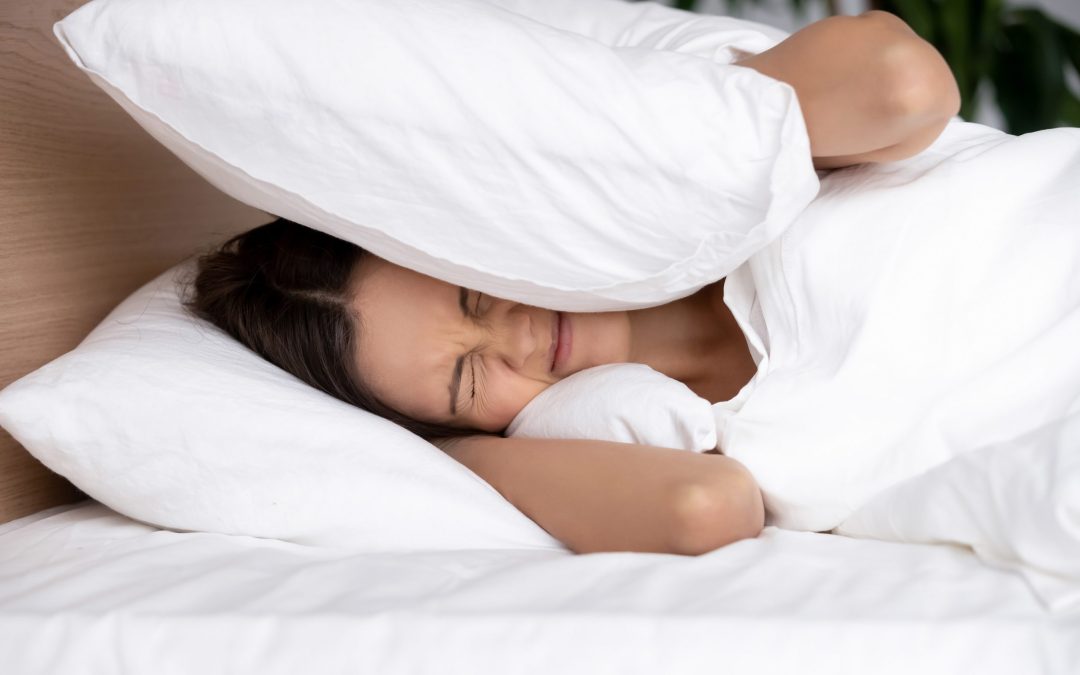Sleep anxiety: how to reframe your negative thoughts
It’s easy to let negative thoughts turn one bad night into a problem. To ease your sleep anxiety, our expert shares her secrets for reframing worries around sleep so you can get back to enjoying peaceful slumber.

It’s easy to let negative thoughts turn one bad night into a problem. To ease your sleep anxiety, our expert shares her secrets for reframing worries around sleep so you can get back to enjoying peaceful slumber.
Sleep… it’s such a simple, natural process. Much like eating and breathing, it seems so innate and should be easy to achieve. Despite this, many of us up and down the country struggle with sleep anxiety. Whether it’s not being able to drop off or struggling to stay asleep for the whole night, our sleep habits can have a real impact on our mental wellbeing and trigger negative thoughts, which can be hard to ignore.
These negative thoughts can have an even bigger impact on our health than the sleep issues themselves, and guess what? They can cause even more problems when it comes to reaching the land of nod.
We’ve enlisted the help of sleep expert, Stephanie Romiszewski, who is an expert sleep physiologist and director of Sleepyhead Clinic and Program to talk us through some of the most common negative thoughts around sleep and show us how, by switching our mindset ever so slightly, we can achieve great things for our health and sleep.
Negative thought: “I won’t be able to get to sleep until the early hours”
Reframe it: “I’m going to stay up and enjoy my evening until I feel sleepy enough to drop off”
‘The reality is you won’t always be able to get to sleep at the time you expect,’ says Stephanie. ‘This isn’t something to worry about; it simply means you don’t have a strong drive to sleep at this time. The best way to physically solve your sleep problem is to build a strong, consistent sleep drive, which is done by spending more time awake during the day and avoiding naps and lie ins.
‘One of the best ways to help alleviate this particular negative thought around sleep is to give yourself permission to go to bed later and change your mindset to: “I’m going to stay up and enjoy my evening until I feel sleepy enough to drop off.” ‘There’s no point going to bed too early and lying anxiously in a dark room. The more time you spend awake, the more chance you will have of falling asleep when you do go to bed.’
Negative thought: “I’m bound to wake in the night and won’t be able to get back to sleep”
Reframe it: “If I wake in the night and can’t get back, I’m going to take advantage and embrace some time to myself”
‘This is a bit of a self-fulfilling prophecy,’ says Stephanie. ‘When you wake in the night – perhaps for a drink or to go to the loo – if you’re already pre-empting that you won’t be able to get back to sleep, your heart rate will increase and your temperature will rise, meaning you’re physiologically not in the right place for sleep. Instead, say to yourself: “if I wake in the night and can’t get back, I’m going to take advantage and embrace some time to myself,” this might be reading a book or catching up on that TV series you started.
‘Don’t be afraid of losing sleep, we call this “sleep debt” – your body will use this “debt” to help you build a strong sleep drive and eventually work into a solid pattern of good quality sleep. This simple mindset shift can set you on the sleepy straight and narrow.’
Negative thought: “If I don’t get eight hours of sleep I’m going to be no use to anyone tomorrow”
Reframe it: “I’m going to give my body eight hours of comfort and rest, if it wants to use that time to sleep, it will do”
‘Sleep and how much we need will vary from person-to-person and no matter how much you need, it’s not always possible to get it,’ says Stephanie. ‘It’s important to let go of the idea of clean sleeping and realise we can’t force our bodies to sleep. Thinking this way only causes anxiety and stress.
‘The amount and quality of your sleep depends on so many variables throughout the day, such as what you eat and drink and how active you are. As long as you give yourself the opportunity to go to sleep for the time you desire, your body will take what it needs from that time. Having periods of not sleeping well is normal; you just need the ratio between the good and the bad nights to be in your favour. Learning to accept this and alter your thought process so you’re not as obsessed with time and statistics is the best way to get your desired sleep quota.’
Negative thought: “I need to get to sleep, I have such a busy day ahead of me”
Reframe it: “I’m going to do my morning yoga, have a delicious breakfast and face the day as I would any other, regardless of how much sleep I get”
‘This negative thought is born out of the idea that one bad night’s sleep will cause all these terrible things to happen,’ says Stephanie. ‘It is true that sleep deprivation – which is different to our bodies choosing not to sleep – can impact our cognitive ability.
‘However, I see thousands of insomnia patients in my clinic every year who hold down jobs and live an otherwise healthy life. Their sleep problems, although frustrating, do not ruin every aspect of their lives. This often comes down to mindset; you can decide how you go into a day. Even after a bad night’s sleep, you can still choose to do some yoga, eat a healthy breakfast, put on your best outfit and walk down the street with your shoulders back and your head up.
‘Often when we go to work and we feel we’re not performing as we should, it tends to be the expectations of ourselves rather than how others see us. One or two poor nights are very unlikely to affect you, but the worry and anxiety around when trying to sleep may do. This will also keep you up longer when trying to sleep, so it’s vital you switch those negative thoughts around.’
Negative thought: “My lack of sleep is going to cause health problems”
Reframe it: “My anxiety when trying to sleep is more likely to cause health problems, best to relax”
‘Remember, being unable to get to or stay asleep is different to actively restricting your sleep and not giving your body the opportunity to sleep if it wants it. The reality is, poor sleep is probably not going to pose a serious health problem – not in the short term. It’s often our worries and fears which cause us the most harm, not the physical act of not getting sleep.’
Negative thought: “There’s clearly something wrong with me, I must be the only person who can’t sleep”
Reframe it: “I’m perfectly normal, I just need to find the right solution to my sleep situation”
‘This is a really normal worry and one which I hear often,’ says Stephanie. ‘As humans, we’re very proactive creatures and we start looking at how we can overcome an issue. Logic tells us to spend more time in bed, whether that’s having a lie-in or taking time to nap during the day in order to try catch up on our missed sleep. We might even visit our GP or go online to look for solutions and consider taking medication. However, it’s important to recognise that there’s a habitual nature underneath it all and it can’t simply be solved with tablets. It’s not that there’s something wrong with you, it’s often that you’ve been given the wrong advice or techniques to deal with your situation.
‘Different things work for different people, but one way to help tackle sleep issues including insomnia is to undergo cognitive behavioural therapy (CBT) for insomnia, which is very different to CBT for anxiety and should always be delivered by a sleep professional.’
READ MORE
Sleep myths: 12 common fallacies debunked





